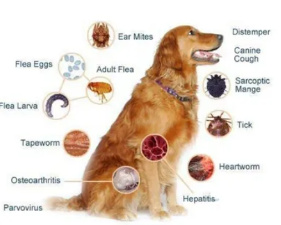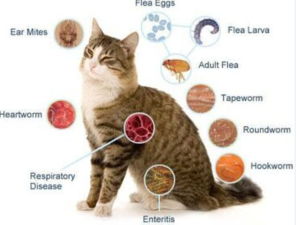Parasites in pets are a common problem and a matter of great concern to pet owners.
Because pet parasites not only harm the health of pets, most parasites are also a great threat to pet owners, and even life-threatening.


Parasites in pets are a common problem and a matter of great concern to pet owners.
Because pet parasites not only harm the health of pets, most parasites are also a great threat to pet owners, and even life-threatening.
The importance of pet parasites
-More than 90% of pet owners do not know enough about the importance of deworming! You may be in this group. Although many owners believe that cats and dogs will not be infected with parasites, in fact, even if they are dewormed regularly every year, they should not simply buy deworming medicine or drops. The risk of pets being infected with parasites is real, no matter how healthy and strong they look.
-Parasitic infections pose a serious threat to pet health. Not only young pets are at risk, but adult pets may also develop parasitic symptoms due to decreased immunity, illness or stress, such as long-term soft stools, growth stagnation, and even dangerous symptoms such as bloody stools, diarrhea, and vomiting in severe cases. These parasitic problems may lead to misdiagnosis, pose a threat to the health of pets and family members, and may also cause expensive medical expenses.

Types and prevention of intestinal parasites
▍ Types of nematodes and anthelmintics
Next, let's take a deeper look at the types and hazards of intestinal parasites. Intestinal parasites are mainly divided into two categories: nematodes and protozoa. Among nematodes, roundworms, hookworms and tapeworms are more common. Usually, the anthelmintics we use, such as Bayer, are mainly aimed at nematodes, while Advocate can expel roundworms and hookworms, but not tapeworms. Therefore, common nematodes are roundworms, hookworms, and tapeworms, and each parasite reacts differently to different anthelmintics.
▍ Hazards of protozoan parasites
Active protozoan parasites such as Toxoplasma and Coccidia are extremely harmful. This type of parasite cannot be detected by the naked eye and can only be observed under a microscope. Among them, Toxoplasma is particularly dangerous, and many owners and pet hospitals often ignore it. Parasites such as coccidia, toxoplasma, giardia and tritrichomonas fetus pose a serious threat to the health of cats and dogs and may cause a variety of health problems.

Systematic deworming methods and precautions
▍ Deworming steps and drug selection
For the health of pets, we must pay attention to and correctly perform pet deworming. Not only should we pay attention to the removal of nematodes, but we should also be vigilant about the harm of protozoan parasites to ensure comprehensive protection for pets. First of all, it is recommended to use Bayer to remove intestinal nematodes. At the same time, Frontline can be used for external deworming to prevent tapeworms from spreading through fleas. Deworming requires choosing appropriate drugs according to the weight and category of the pet, and following the doctor's advice if it has been confirmed.
▍ Repeated infection and preventive measures
After completing deworming, we need to pay attention to preventing repeated infection. Especially for cats, the litter box and environment can be disinfected and new cat litter can be replaced the next day after each deworming medicine is taken. Keeping the home environment clean is also important to prevent dogs from being repeatedly infected.
▍ Deworming precautions in special circumstances
In special circumstances, such as cats with poor liver and kidney function or during illness, deworming should be carried out with special caution. Be sure to consult a veterinarian before taking the medicine to ensure safe and effective deworming and avoid unnecessary risks.
▍ Clean your pet regularly
Ticks often seek parasitic opportunities through the hair and skin of pets. Regular bathing can reduce tick infection while keeping your pet comfortable. In order to reduce the risk of tick parasitism, we need to bathe and clean our pet regularly to keep its hair clean and healthy. Bathing not only helps pets keep clean and hygienic, but also allows us to detect abnormal conditions that may occur in pets in a timely manner.
▍ Clean your pet's environment regularly
Keeping your pet's living environment clean is essential for the health of your pet. Regularly cleaning your pet's living environment can effectively reduce the growth of bacteria and parasites. Regularly cleaning your pet's nest, mat, and surrounding environment can reduce the growth of bacteria and parasites and provide your pet with a clean and hygienic living space.
Comprehensive recommendations
In order to ensure the health of pets and owners, regular deworming is recommended to ensure the health of pets and owners. It is recommended to perform external deworming for pets on a monthly basis, regardless of the active period of external parasites. This can effectively prevent potential health problems, rather than waiting until problems arise before taking action.



